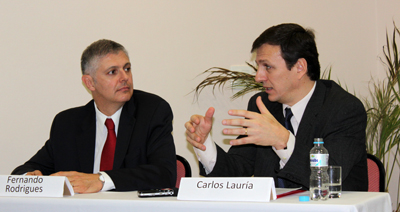During the presentation of our annual survey, Attacks on the Press, in Sao Paulo, there was clear concern about the ability of the local media to report on issues of public interest without judicial interference. Journalists for three of the largest national dailies–O Estado de Sao Paulo, Folha de Sao Paulo, and O Globo–together with reporters for Sao Paulo’s main radio stations and a group of local advocates, gathered at the Blue Tree Hotel in the booming Brazilian city to hear perspective on the status of press freedom in the country.
The event was organized jointly with the Brazilian association of investigative journalists, known as ABRAJI. Widely respected among local reporters, ABRAJI was founded in 2002 by some of the country’s most prominent journalists and has made great strides in promoting investigative journalism throughout Brazil. The organization has already trained and educated 4,000 journalists, and has a program that monitors press freedom violations.
Fernando Rodriguez–president of the group’s board of directors, and one of Folha de Sao Paulo’s most prominent journalists–made a brief introduction and stressed the importance of CPJ’s decision to select Brazil for the book’s regional launch.
My essay in Attacks on censorship caught widespread attention in the local media. Fully aware that politicized decisions by the judiciary are hindering coverage on sensitive issues, the Brazilian press was excited to know that this troubling pattern affecting free expression has been laid bare to a wider international audience.
This interest resulted in extensive media coverage: “Media Censorship in Latin America Has Reached Its Highest Level, said CPJ,” read Folha‘s headline. O Estado published a story announcing the launch on Tuesday, and focused on Google’s 2010 report, which said that Brazilian authorities had demanded that content be removed from the company’s servers on 398 occasions in the first six months of the year, in its Wednesday’s edition. Rio de Janeiro’s national daily O Globo looked into journalists killed and imprisoned in its coverage of the report.
During lunch on Wednesday with some of the top executives with the association of Brazilian publishers (known as ANJ), it was clear that the judicial ban on O Estado preventing the paper and its website from reporting on a corruption investigation involving the family of Senate President José Sarney has created a unified front of media working together against censorship.
The Brazilian federal government has also been extremely receptive to CPJ’s report. As a proof of that, meetings with four top government officials in the administration of President Dilma Rousseff have been confirmed for today and Friday. Minister of Communication Paulo Bernardo, Human Rights Minister Maria do Rosário, Secretary of Communications Helena Chagas, and the president of the Supreme Federal Tribunal, Cezar Peluso, will receive copies of Attacks, and hopefully engage in vital discussions on the most pressing issues affecting the work of the Brazilian press.
